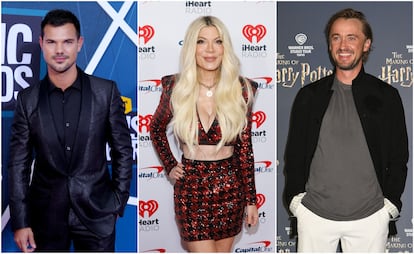‘Jobless’ celebrities, or the eternal profitability of past fame
A new type of celebrity has emerged. They haven’t done anything new for a long time, but they are very active on social media, living off their past successes, or starring in a review podcast. Tom Felton, Taylor Lautner, and Tori Spelling are a few examples


“Whatever happened to…?” is a tried and true formula in modern journalism and is a perennial favorite in internet searches. From time to time we remember someone who was talked about a lot in the past, but who has now disappeared. To satisfy our curiosity, we google their name to find out where they are now. When I write those words in my browser, it autocompletes the sentence, suggesting, in this order: whatever happened to Macaulay Culkin, Lindsey Lohan, the cast of Glee, and Paris Hilton. Suggestions, even if one has not thought much about them in recent times, are probably based on what is trending right now and on topics that allegedly interest us according to the almighty algorithm.
But the “whatever happened to” articles could be an endangered species, because more and more celebrities whom we haven’t heard from for a long time, have decided to emerge from oblivion off their own bat and return to the spotlight (kind of), mainly via social media. This phenomenon, which has occurred especially at an international level, has not gone unnoticed by eagle-eyed — and angry — users of these platforms who, after witnessing these celebrities’ rebirth, now refer to them as “jobless” celebrities. The nickname doesn’t even have to do with the fact that they don’t really work, but rather that their current work is usually not up to par in media interest with something they did in the past. A past that they hark back to again and again in an effort to milk the most out of that distant success.
One of the clearest examples of this trend is Tom Felton, the British actor who played the evil Draco Malfoy in the Harry Potter film saga. It is very possible that, if the reader is an active TikTok user, they have come across Felton’s face there and felt a little embarrassed for him. Almost all of the content he produces is connected, either directly or indirectly, to J.K. Rowling’s creation. He has filmed himself reacting to videos in which other users imitate him saying the word “Potter,” celebrating a former on-set colleague’s birthday, remembering an anecdote with Daniel Radcliffe, and promoting his memoir, Beyond the Wand, which was published in October 2022 at a time when he was finding new success on social media. Felton has been able to take advantage of a formula that is quite reminiscent of what figures like former athletes have done the world over, based on being friendly, approachable, and following trends on the platform.
The technique has worked wonders for Felton: he has already accumulated more than 10 million followers and more than 155 million likes on TikTok, but he has also attracted a few thousand new critics. Phrases like “Get a job,” “Stop basing your personality on something that happened centuries ago,” or “Let Draco go now” appear over and over again in the comments section of his videos. However, whether due to the adoration of many users or pure hate watching (the pleasure of watching something you hate), the actor has his own hashtag, #DracoTok, which has almost 35 billion views (yes, that number is correct) at the time of writing. But the truth is that he has never stopped working in film and television, although in medium-sized British productions. He could easily live off these jobs, but he has not stopped capitalizing on that long-distant role.
@hp_edit1999 He doesn't deserve that @Tom Felton #tomfelton #dracotok #dracomalfoy #harrypotter #harrypottertiktok #hogwarts #foryou #foryoupage #fypシ
♬ original sound - Stan :)
Felton is by no means the only artist doing this. In a video recently published on YouTube regarding the subject, internet analyst Casey Aonso also cites other characters, such as Taylor Lautner, who played werewolf Jacob Black in the Twilight saga. And for quite some time, he has also been exploiting his past relationship with Taylor Swift (they only dated for three months in 2009) both on social and traditional media. Then there’s Jerry Russo and Jennifer Stone, two of the actors from the Disney Channel children’s series The Wizards of Waverly Place, who for almost a year have been presenting The Wizards of Waverly Pod, a podcast in which they revisit the episodes, telling anecdotes and interviewing other stars, including Selena Gomez. Last week it was announced that Disney is working on a pilot for a sequel to the legendary series, although none of the actors will be part of the cast.
Going back to better times
The review podcast format has been a phenomenon in the United States. There have been many performers who have embarked on reliving old times (and old hits) and commenting on their series. It is such a great success that it is truly striking that it has not been imitated in other countries, or at least not with actors. In this field, perhaps one of the most successful cases has been Office Ladies, which is a program presented by Jenna Fischer and Angela Kinsey. The two played Pam and Angela, respectively, in the acclaimed comedy The Office. Taking advantage of the pull that the series still has and its return to relevance in recent years (especially in the form of clips and memes), the former colleagues review each of the 201 episodes and entertain fans with anecdotes that have never been told before and interview some of their co-stars.
But it’s not just them: Zach Braff and Donald Faison (JD and Christopher in Scrubs) do more or less the same in Fake Doctors, Real Friends with Zach + Donald. Rachel Bilson and Melinda Clarke present Welcome to the OC, Bitches!. Luke Danes does likewise with The Gilmore Girls in I Am All In with Scott Patterson; Jodie Sweetin and Andrea Barber recall Full House in How Rude, Tanneritos!; and Jennie Garth and Tori Spelling (Kelly and Donna) recall their time on 90210MG.
To explain this phenomenon a little, Casey Aonso points out an important fact in her video: almost all of these people became famous in a time before social media existed. It was a simpler time that many remember with a certain nostalgia. The most important work of these “jobless” artists occurred before the world had Instagram or Facebook, let alone a TikTok account. For artists like Felton or Taylor Lautner it was more difficult not to fall into oblivion. They did not have the chance to promote themselves every day on our mobile devices, as other actors, singers, and models can do today, and who quickly become influencers if other jobs are scarce.
So, to make up the lost ground, they have had to take a few more risks online, even if it means making us cringe a little. They will do whatever it takes to become relevant again and be back in our lives and conversations.
Sign up for our weekly newsletter to get more English-language news coverage from EL PAÍS USA Edition
Tu suscripción se está usando en otro dispositivo
¿Quieres añadir otro usuario a tu suscripción?
Si continúas leyendo en este dispositivo, no se podrá leer en el otro.
FlechaTu suscripción se está usando en otro dispositivo y solo puedes acceder a EL PAÍS desde un dispositivo a la vez.
Si quieres compartir tu cuenta, cambia tu suscripción a la modalidad Premium, así podrás añadir otro usuario. Cada uno accederá con su propia cuenta de email, lo que os permitirá personalizar vuestra experiencia en EL PAÍS.
¿Tienes una suscripción de empresa? Accede aquí para contratar más cuentas.
En el caso de no saber quién está usando tu cuenta, te recomendamos cambiar tu contraseña aquí.
Si decides continuar compartiendo tu cuenta, este mensaje se mostrará en tu dispositivo y en el de la otra persona que está usando tu cuenta de forma indefinida, afectando a tu experiencia de lectura. Puedes consultar aquí los términos y condiciones de la suscripción digital.








































